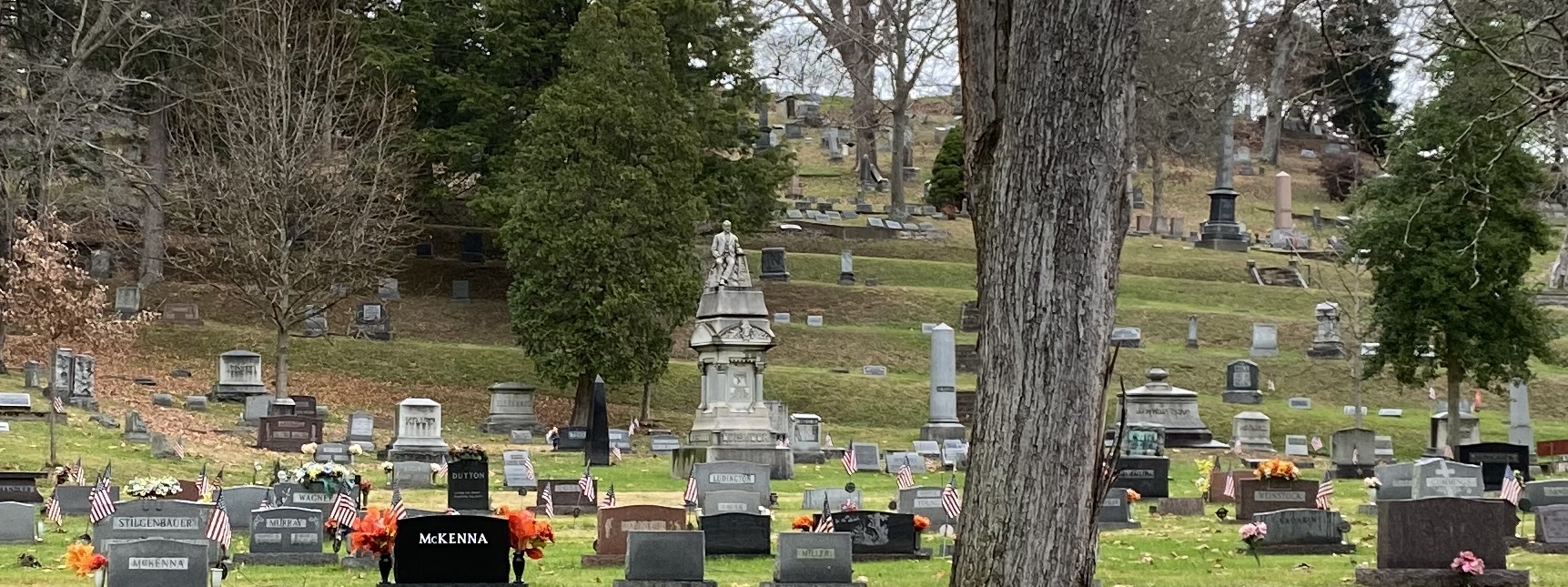Imagine the TV show Connections, but it’s a stream of consciousness series of errors because I’m an impulsive idiot. I’d call it Missed Conceptions.
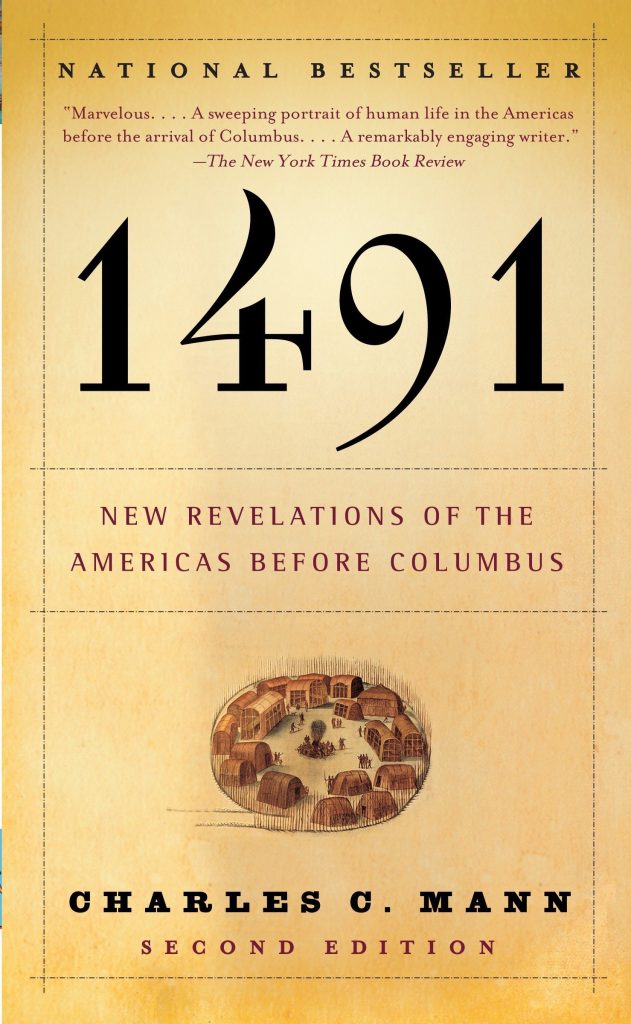
1491, a book that came out in 2006, is a reframing of what the Americas (continents North and South) were like before Columbus arrived. Contrary to general colonist perception, the people living in the Americas were “…more numerous and organized, had lived there for a longer time, and controlled the natural environment to a great degree”.
I lived most of my youth in a fairly small town: highly-educated yet fairly white. While we had neighbourhoods with blatantly native names like “Cataraqui“, my mental model was implicitly built such that there was nothing really here before the white people came. Kingston is one of Ontario’s oldest towns, and in its’ downtown has many old stone buildings. It even was the original capital of Canada, before we moved the capital north to Bytown, later renamed to Ottawa.
I moved to Toronto for grad school in 2008. On visits before the permanent move, I could never fit the map of this huge city it into my head. The first few times I went to a bar that later became my favourite, I was only able to find it while heavily inebriated. It is now closed. To contrast, in Kingston I was able to easily bike end-to-end in a single day, an easy wrap around the entire world as far as I knew it. Toronto was a much larger and more multicultural city, and I spent most of my time living in or near Chinatown, as a visible minority for the first time in my life. In every place I’ve lived since then, I’ve never felt like the racial majority again, and I like it that way.
Around this time, I also started expanding my mental world; sometimes this included pretty precociously tedious self-performances like reading all of Ulysses nearly exclusively in a bar named James Joyce (also closed) while exclusively drinking Guinness. This also led to purchasing a copy of 1491, a book that came home with me from the BMV one day and sat on my shelf, next in queue. Of course, other books kept getting in front of the queue. And then I moved a couple times [understatement], and the book remained unopened.
I’ve lived in many different cities since I bought the book, and it came with me each time: Seattle, Bangalore, Cambridge, San Francisco, and now New York.
For Bangalore, I wanted to prepare by learning bits of a local language. At first, I thought this would be Hindi, but the state Bangalore is in (Karnataka) has its own local language, Kannada. My colleagues were from all over South Asia, and they didn’t speak it either, and so spoke to local drivers and cashiers in the same broken English as I did. Until actually going there, I had no idea India was so heterogeneous – it’s really closer to the European Union than a homogeneous country it’s often thought of.
While in Cambridge (UK, not Massachusetts), I took a road trip through Scotland. There were many stone buildings casually all over the side of the road, technically castles I suppose, but as frequent and unvalued as a decomposing country shed. It was a shock to my system that humans had really been around so long. Any one of these piles of stone would have been a primary attraction if found in Ontario.
North of San Francisco, there is a former island prison called Alcatraz (of The Rock). I did a tour, a large bonus of which is a beautiful view of the San Francisco Bay from the island. The demographic that chooses to tour a prison is one I don’t normally fit into. The tour of the legendary prison emphasized lurid criminalness – how dangerous the convicts here were, how they tried to escape and failed, how cold the water was here. But I was distracted by the 6 foot tall letters carved into the top of the building that said “Home of the Free Indian Land”. For, you see, Alcatraz was occupied by Native protesters for nearly two years. This did not fit into the narrative people hoped for from a prison tour so these letters stared at me, unacknowledged, and with my terrible phone reception I couldn’t even scour the internet for what was going on until I got home.
I left San Francisco in 2016, deciding to acquire my own green card (permanent US residency) so I’d have job autonomy before working in the US again. The estimated low end for how long this would take was 4 months, but it took 2.5 years (the US government was shut down a couple times). All my stuff, including my books and our star of this show, 1491, went into Uhaul storage in SF, where they lived for over 3 years until I paid to have it all moved to my apartment in New York in fall 2019, finally. 1491 sat prominently on my shelf again, still near the front of the queue for over a decade by this point.
It was only after I properly felt settled in in NYC that the pandemic happened. I really lost my mind, just like everyone did in their own little way. The small, very central, apartment I chose was great if you were an outgoing person, but it had become the site of an unapproved, ethically unsound, experiment in forced solitary confinement. I invented the coping strategy ritual of identifying weird, very cheap, AirBnBs within a 8 hour drive of New York, located in places I’d never otherwise go to, and spending a week or two there. There are a surprising amount of small towns with decaying mansions in them, and I stayed in several, leaning into a spooky solitary vampire ghost aesthetic as a coping strategy for everything else that was going on.
One of these towns was Marietta Ohio, chosen until for the extremely cheap yet spooky mansion I found on AirBnB.
I discovered only after I arrived that Marietta was the site of major archeological interest – Earthworks constructed from 100 BCE to 500 CE. I sought out the peak of these Earthworks, named Quadranaou, and was somewhat disappointed by its meagerness.
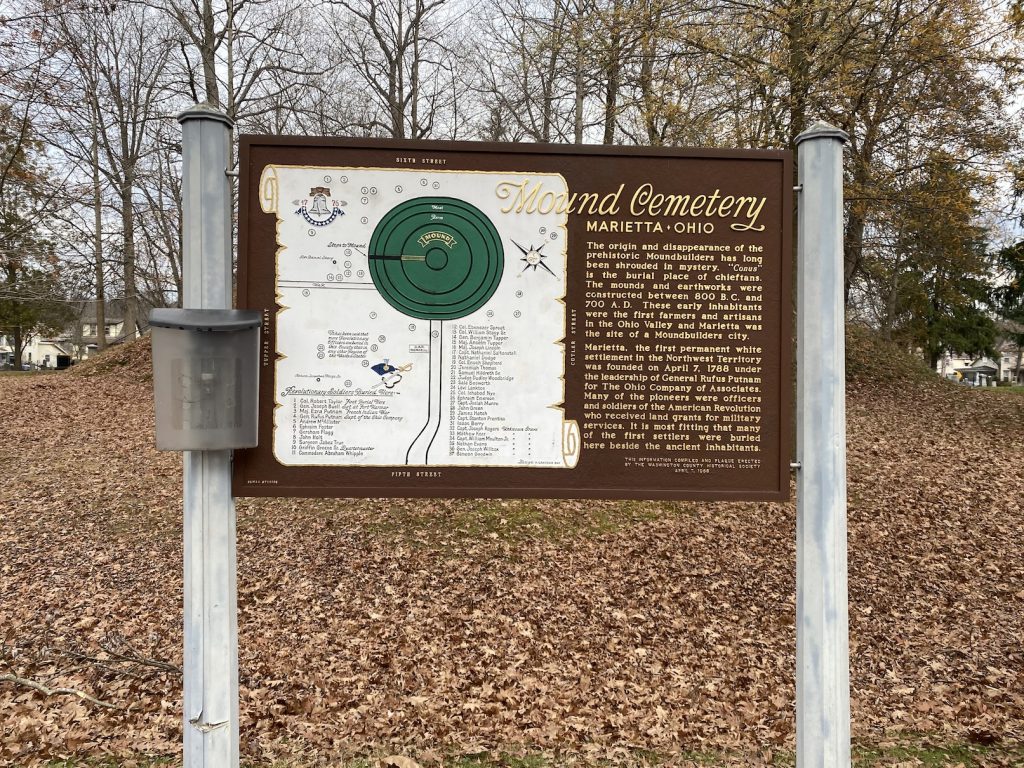
Though, this did not conflict significantly with my mental model of pre-Columbian Americans.
Several days later, as I was leaving, I did a double-take while driving by a cemetary.
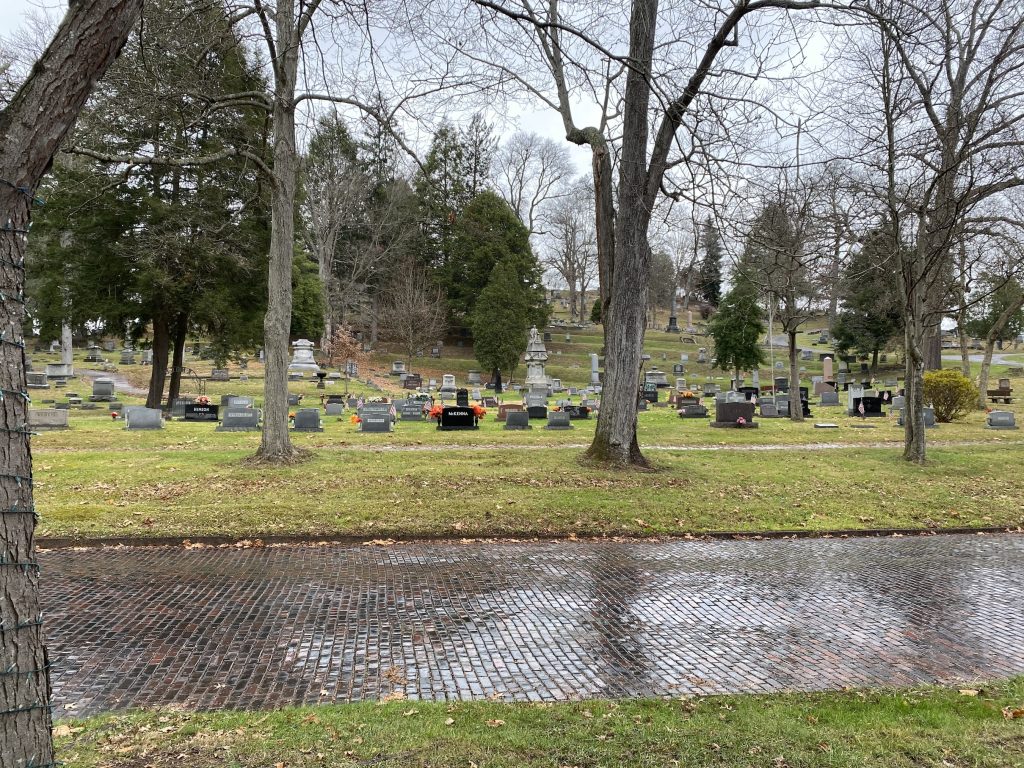
Zooming in…those are unmistakable earthen steps
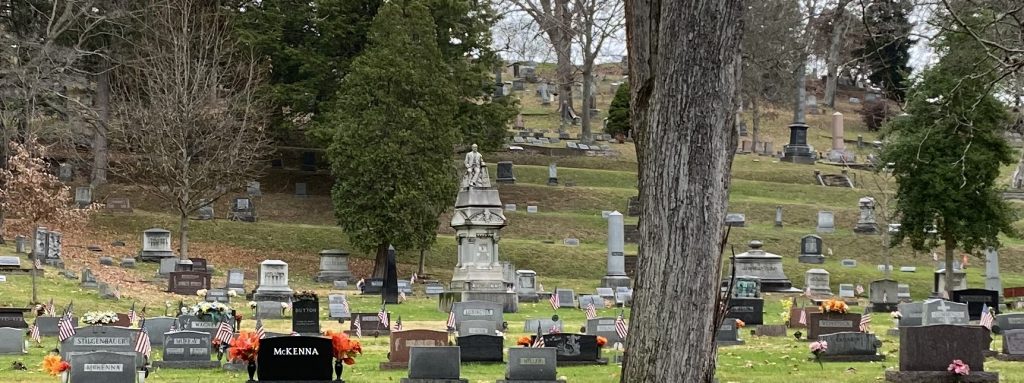
So, the pitiful little mound, in a park with a plaque, was the little fence around the meager attraction, the designated area for pre-Columbia history. Meanwhile, the entire town, and especially the cemetary for some reason, was built on top of the original earthworks, which of course do not exist in their original form.
Let’s skip ahead nearly two years.
Finally, I found myself with a free evening in the late summer of 2022, and grabbed 1491 off my bookshelf and went out into the night to find a spot to drink, have a snack, and get into it. I ended up at a Thai place, incidentally Thailand being one of the few countries never colonized by anyone else. I’ve backpacked through Southeast Asia twice, and loved it (especially because the food was cheap and disproportionately good). One of the most memorable moments was crossing from Cambodia back into Thailand overland by bus. In Thailand, they drive on the left, but on Cambodia, they drive on the right. Perhaps in land crossing between two countries with a lot of money, there is some sort of corkscrew overpass situation to switch the sides of the roads, but not where we crossed at Khlong Yai. Instead, all vehicles stopped at the linear intersection, and one vehicle at a time would drive diagonally through it from the left to right side, and vice versa. I was frozen in thought with how awkward this was, but could not think of a simpler way to do this. I encountered a surprising unacknowledged seam of strangness in the world. It was paralyzingly funny.
I opened 1491 and dove in, finally finally.
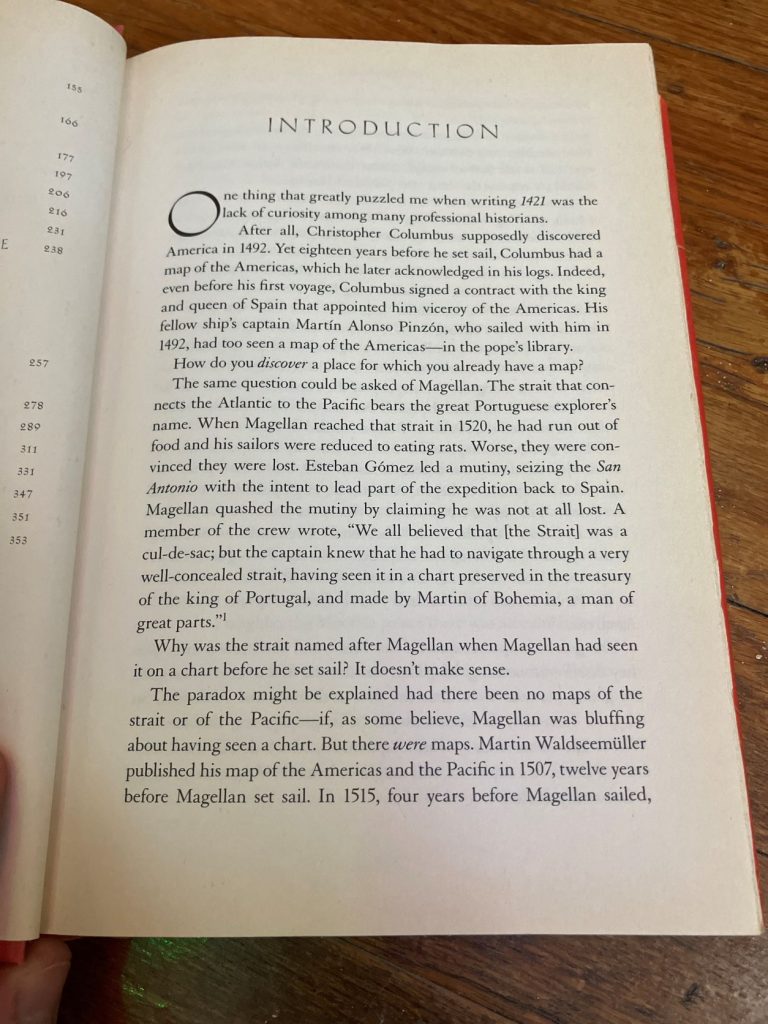
The first sentence, about historians missing the picture, seemed appropriate for the book as I knew it. But afterwards, it felt increasingly…off somehow. Surely all this stuff about Magellan was just framing to talk about how the European interpretation of the Americas came to be, right? I continued a bit more, but wanting to tell how where this book was going, I had to flip back to the table of contents to figure out how the arc of this book was going to make sense…
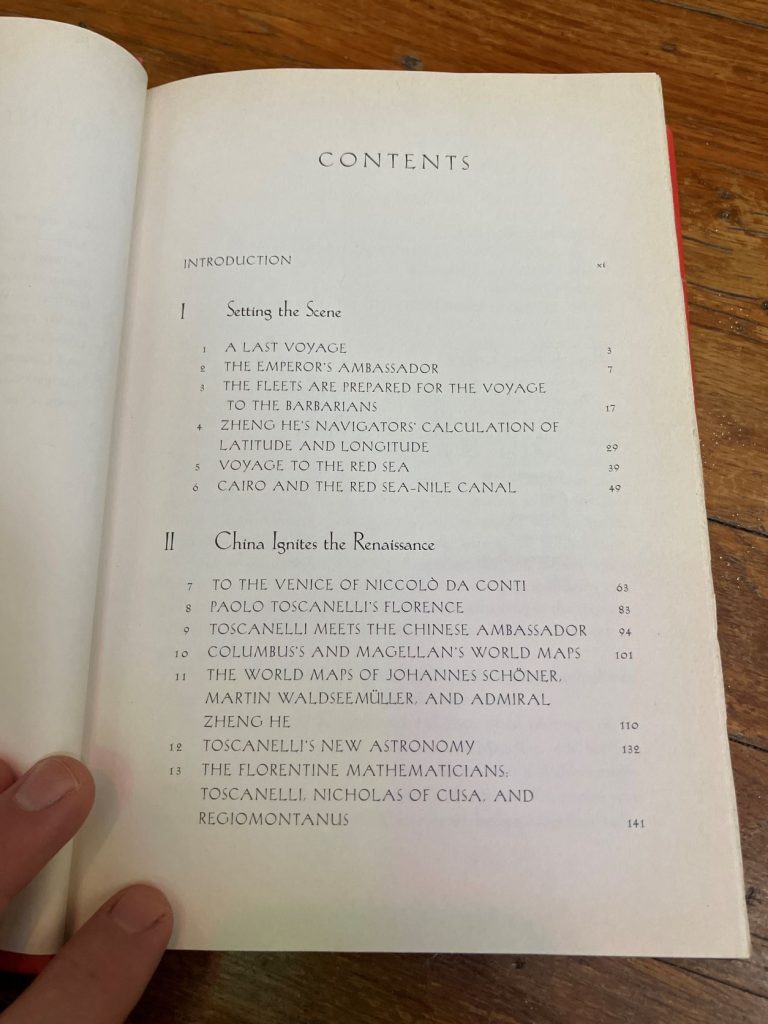
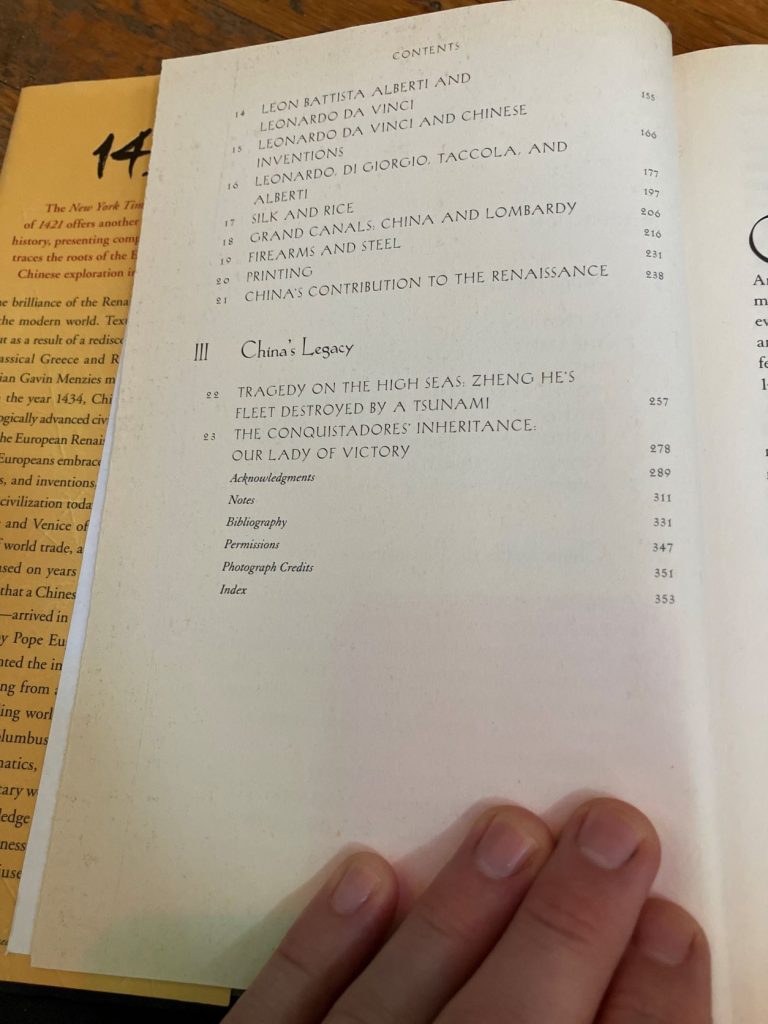
Dear Reader, I was not reading 1491. The book in my hands was, in fact, titled 1434.
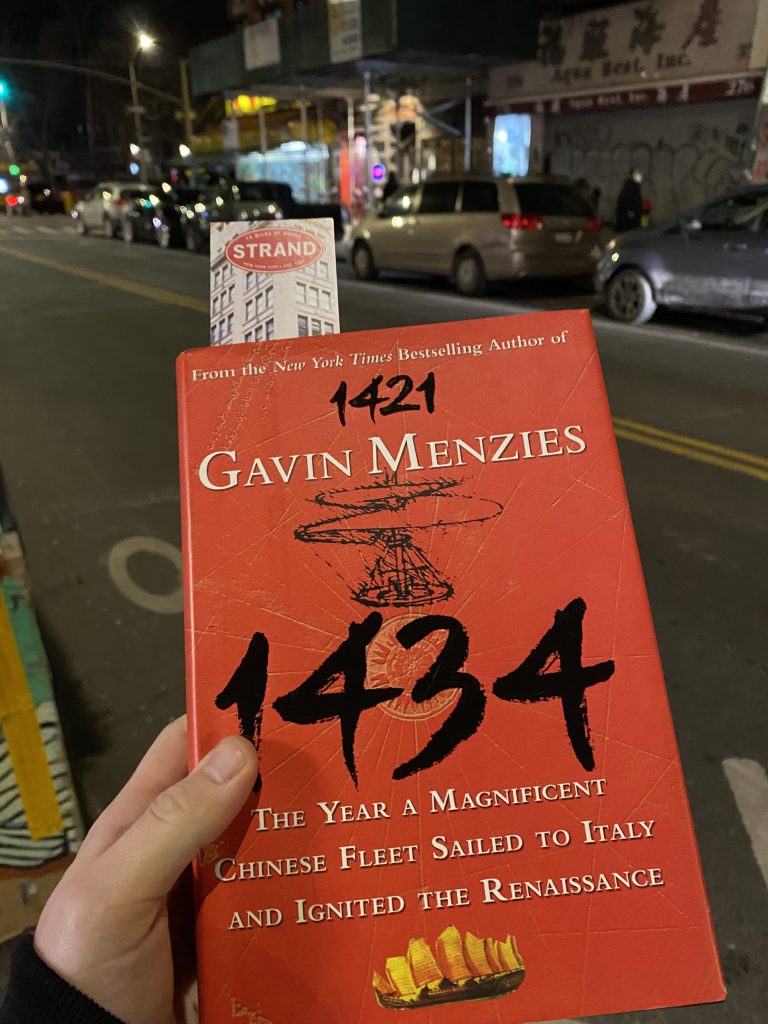
Here is a picture I took of this book, right after I left the bar; my emotional state alternating violently between shame and uncontrollable laughter.
1434 was written by Gavin Menzies, a British former submarine officer and conspiracy theorist. The book in my hand was, in fact, a sequel to his first book, 1421: The Year China Discovered the World. He died in 2020, and his personal website is in the charming genre of gradually decaying internet.
I finished reading 1491 two months ago, about 16 years after I intended to, so I consider this matter closed. It was a wonderful book and significantly enhanced my worldview.
